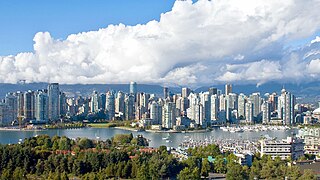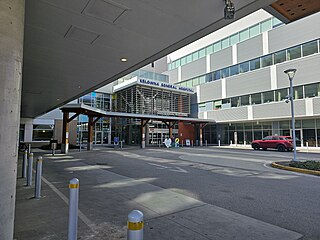Related Research Articles

The Lower Mainland is a geographic and cultural region of the mainland coast of British Columbia that generally comprises the regional districts of Metro Vancouver and the Fraser Valley. Home to approximately 3.05 million people as of the 2021 Canadian census, the Lower Mainland contains sixteen of the province's 30 most populous municipalities and approximately 60% of the province's total population.

Hope is a district municipality at the confluence of the Fraser and Coquihalla rivers in the province of British Columbia, Canada. Hope is at the eastern end of both the Fraser Valley and the Lower Mainland region, and is at the southern end of the Fraser Canyon. To the east, over the Cascade Mountains, is the Interior region, beginning with the Similkameen Country on the farther side of the Allison Pass in Manning Park. Located 154 kilometres (96 mi) east of Vancouver, Hope is at the southern terminus of the Coquihalla Highway and the western terminus of the Crowsnest Highway, locally known as the Hope-Princeton, where they merge with the Trans-Canada Highway. Hope is at the eastern terminus of Highway 7. As it lies at the eastern end of the Fraser Valley in the windward Cascade foothills, the town gets very high amounts of rain and cloud cover – particularly throughout the autumn and winter.

Gulf and Fraser Fishermen's Credit Union, operating as Gulf & Fraser, is a member-owned financial institution in Burnaby, British Columbia, Canada, and is the sixth largest credit union in British Columbia by asset size. With a history dating back to 1940, Gulf & Fraser provides banking and a variety of financial services including borrowing, investments and financial planning. It is insured by the Credit Union Deposit Insurance Corporation of British Columbia, a crown corporation that insures the deposits of credit union members.

British Columbia is the westernmost province of Canada, bordered by the Pacific Ocean. With an area of 944,735 km2 (364,764 sq mi) it is Canada's third-largest province. The province is almost four times the size of the United Kingdom and larger than every United States state except Alaska. It is bounded on the northwest by the U.S. state of Alaska, directly north by Yukon and the Northwest Territories, on the east by Alberta, and on the south by the U.S. states of Washington, Idaho, and Montana. Formerly part of the British Empire, the southern border of British Columbia was established by the 1846 Oregon Treaty. The province is dominated by mountain ranges, among them the Canadian Rockies but dominantly the Coast Mountains, Cassiar Mountains, and the Columbia Mountains. Most of the population is concentrated on the Pacific coast, notably in the area of Vancouver, located on the southwestern tip of the mainland, which is known as the Lower Mainland. It is the most mountainous province of Canada.

The British Columbia Coast, popularly referred to as the BC Coast or simply the Coast, is a geographic region of the Canadian province of British Columbia. As the entire western continental coastline of Canada along the Pacific Ocean is in the province, it is synonymous with being the West Coast of Canada.

Northern Health is the publicly funded healthcare provider for the northern half of the Canadian province of British Columbia. Northern Health serves over 300,000 people in an area of 600,000 square kilometres. It was established as one of five geographically based health authorities in 2001 by the Government of British Columbia.
Interior Health is a regional health authority in British Columbia. It is one of the five publicly-funded regional health authorities, serving the southern Interior region of British Columbia.
The Fraser Health Authority (FHA) is one of five regional public health authorities in British Columbia. It is governed by the provincial Health Authorities Act.

B.C. Women's Hospital & Health Centre, an agency of the Provincial Health Services Authority (PHSA), is a Canadian hospital located in Vancouver, British Columbia, Canada, specializing in women's health programs. It is the only facility in Western Canada dedicated to the health of women, newborns and families, and is the largest maternity hospital in the country. It is a teaching hospital and major provincial health care resource, and is a key component in women's health research.

British Columbia Children's Hospital is a medical facility located in Vancouver, British Columbia, and is an agency of the Provincial Health Services Authority. It specializes in health care for patients from birth to 16 years of age. It is also a teaching and research facility for children's medicine. The hospital includes the Sunny Hill Health Centre, which provides specialized services to children and youth with developmental disabilities aged birth to 16 years.
The Ministry of Health is a department of the Government of British Columbia which oversees the provincial healthcare system. It manages services including the Medical Services Plan, HealthLinkBC, and the PharmaCare program.
Richmond Hospital (RH) is a general hospital in Richmond, British Columbia, Canada. The Vancouver Coastal Health Authority (VCH) is responsible for Richmond Health Services and Richmond Hospital.

Kelowna General Hospital (KGH) is a tertiary referral hospital located in Kelowna, British Columbia operated by Interior Health that offers medical care in the Central Okanagan. In British Columbia, Kelowna General is the only hospital outside the Lower Mainland or Vancouver Island that performs angioplasty or cardiac surgery.

Peace Arch Hospital (PAH) is a 146-bed acute care facility, and Level IV trauma centre owned and operated by Fraser Health. The hospital is located at 15521 Russell Avenue, White Rock, British Columbia, Canada, and its catchment area includes South Surrey.
First West Credit Union is British Columbia's third largest credit union with nearly $18.6 billion in total assets and assets under administration and more than 253,000 members. Its core business is traditional banking, the provision of personal and business daily banking services. First West has the largest geographic reach of any credit union in the province with 45 branches throughout B.C. The credit union is headquartered in the Vancouver suburb of Langley and has regional administration centres in Duncan on Vancouver Island and in Penticton in B.C.’s Southern Interior.

Royal Columbian Hospital (RCH) is among the oldest hospitals in British Columbia and one of the busiest in the Fraser Health Authority. It is located in New Westminster overlooking the Fraser River and is the only hospital in the Lower Mainland that is immediately adjacent to a Skytrain station (Sapperton).

Delta Hospital is a community hospital, and Level V trauma centre owned and operated by the Fraser Health Authority in the city of Delta, British Columbia.
The COVID-19 pandemic in British Columbia formed part of an ongoing worldwide pandemic of coronavirus disease 2019 (COVID-19), a novel infectious disease caused by severe acute respiratory syndrome coronavirus 2 (SARS-CoV-2). On January 28, 2020, British Columbia became the second province to confirm a case of COVID-19 in Canada. The first case of infection involved a patient who had recently returned from Wuhan, Hubei, China. The first case of community transmission in Canada was confirmed in British Columbia on March 5, 2020.
Chilliwack General Hospital is a community hospital facility located in Chilliwack, British Columbia, which is operated by the Fraser Health Authority (FHA).
References
- ↑ "About Fraser Health". www.fraserhealth.ca. Retrieved October 3, 2024.
- ↑ "Fraser Health Hospitals". midwifery.ubc.ca. Retrieved October 3, 2024.
- ↑ "Locations and services". www.fraserhealth.ca. Fraser Health . Retrieved October 3, 2024.
- ↑ Harris, Brent (June 2012). "Interior Health Authority Hospitals and Health Centres" (PDF). interiorhealth.ca. Interior Health . Retrieved October 4, 2024.
- ↑ "Location Listing Page". www.interiorhealth.ca. Interior Health. Retrieved October 4, 2024.
- ↑ "Creston Valley Hospital & Health Centre". Interior Health. Retrieved October 4, 2024.
- ↑ White, Cindy (June 13, 2022). "Lytton woman lashes out at Interior Health over job posting for a new doctor that glosses over fire disaster – BC News". www.castanet.net. Retrieved October 4, 2024.
- ↑ "Hospitals & Health Centre Locations". www.islandhealth.ca. Retrieved October 28, 2024.
- ↑ "Find a facility | Northern Health". www.northernhealth.ca. Retrieved October 29, 2024.
- ↑ "Hospital care | Vancouver Coastal Health". www.vch.ca. Retrieved October 29, 2024.
- ↑ "Our Services". www.phsa.ca. Retrieved October 29, 2024.
- ↑ "Locations | Providence Health Care". www.providencehealthcare.org. Retrieved October 29, 2024.
- ↑ "Formal goodbye ceremony takes place at St. Joseph's". Comox Valley Record. October 22, 2017. Retrieved October 28, 2024.
- ↑ "Menno Hospital – Menno Place". mennoplace.ca. Retrieved September 18, 2024.
- ↑ "Sisters of St. Ann: 160 Years of Spiritual and Social Leadership". Little Flower Academy. July 17, 2018. Retrieved September 27, 2024.